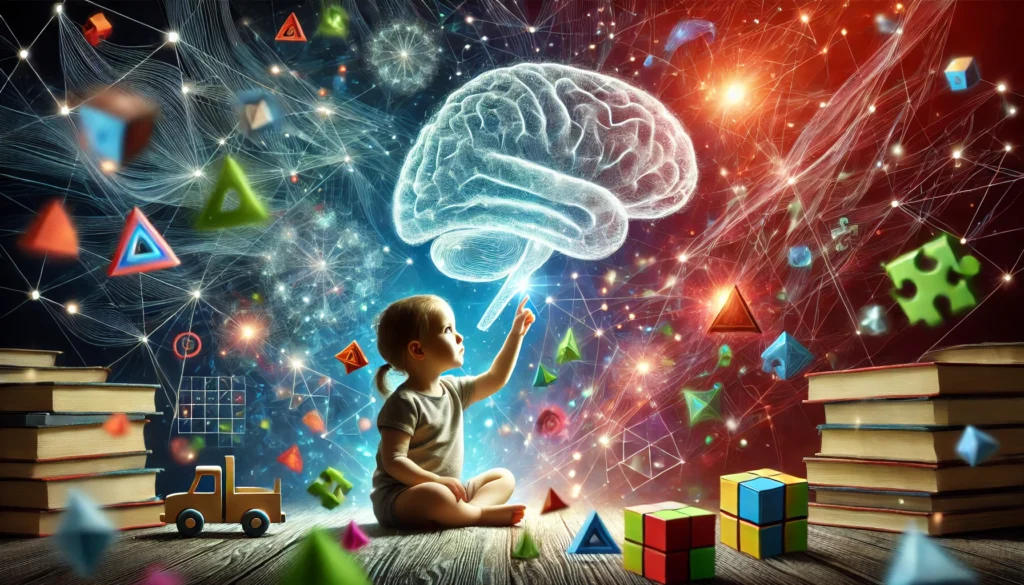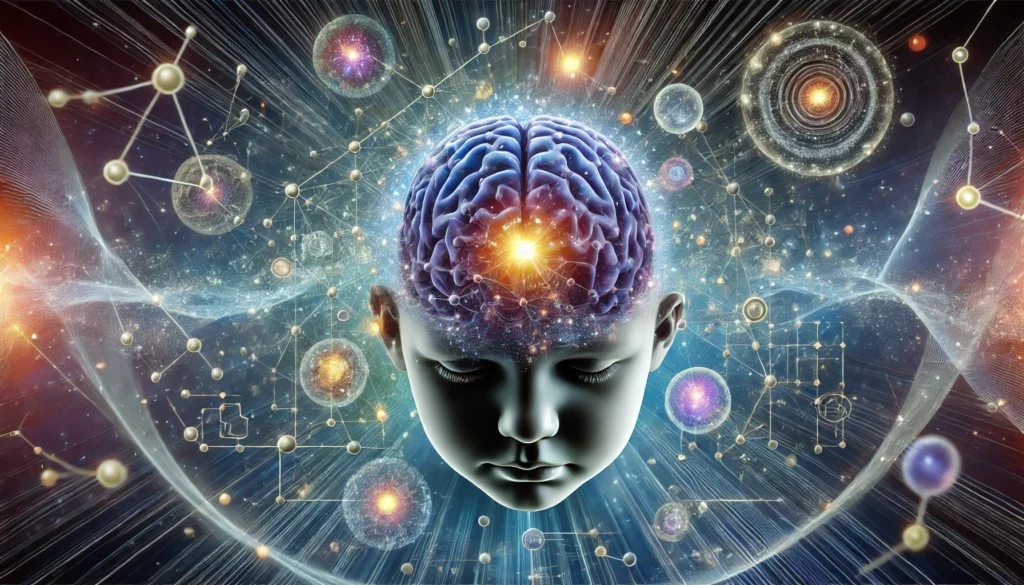The Importance of Cognitive Development in Childhood
Childhood is a crucial period for cognitive development, as the brain rapidly forms new connections and strengthens neural pathways. Engaging children in stimulating mental activities can significantly impact their ability to process information, solve problems, and retain memories. Brain games for kids are particularly effective in enhancing these cognitive functions, providing structured challenges that encourage reasoning, logic, and critical thinking. Unlike passive forms of entertainment, interactive mind games for kids help children develop stronger attention spans and more efficient memory recall. By incorporating these games into their daily routine, children can experience improved learning outcomes and heightened cognitive agility.
You may also like: “Boost Your Memory & Recall: The Best Brain Training for Neural Pathway Strengthening”
How Brain Games for Kids Strengthen Memory and Focus
Memory and focus are essential components of learning, and developing these skills early on can yield long-term benefits. Brain games for kids are designed to target specific cognitive functions, training the brain to retain and retrieve information efficiently. Games that require pattern recognition, sequencing, and problem-solving activate multiple areas of the brain, reinforcing neural pathways responsible for memory storage. Additionally, mind games for kids often encourage sustained attention by gradually increasing in difficulty, helping children build the ability to concentrate for extended periods. This consistent cognitive engagement leads to enhanced focus and greater mental endurance in academic and everyday tasks.
The Science Behind Mind Games for Children’s Cognitive Growth
Neuroscientific research supports the use of cognitive training games in fostering intellectual growth in children. Mind games for childrens learning engage different regions of the brain, promoting neuroplasticity—the ability of the brain to adapt and rewire itself in response to new challenges. These games stimulate the prefrontal cortex, which governs executive function, and the hippocampus, which is responsible for memory processing. Interactive challenges that require strategic thinking, logical reasoning, and quick decision-making can strengthen these brain areas. By integrating scientifically-backed mind games for kids into learning routines, parents and educators can optimize children’s cognitive potential.

The Best Brain Games for Kids to Improve Cognitive Function
Selecting the right brain games for kids involves choosing activities that engage multiple cognitive skills simultaneously. Games like Sudoku and crossword puzzles challenge children’s logical reasoning and vocabulary recall, reinforcing verbal memory. Chess and other strategy-based board games enhance critical thinking and problem-solving capabilities by requiring players to anticipate future moves. Card games such as memory matching games develop pattern recognition and improve short-term recall, essential for academic success. Additionally, physical puzzles like jigsaw puzzles stimulate spatial awareness and concentration, promoting fine motor skills alongside cognitive engagement. These diverse game formats ensure a well-rounded approach to mental training for children.
Integrating Mind Games for Kids into Daily Learning Routines
Establishing a habit of playing brain games for kids on a daily basis can significantly boost their cognitive development. Parents and educators can introduce structured play sessions that incorporate a variety of mental exercises tailored to children’s age and skill level. Encouraging children to play games that require problem-solving and analytical thinking helps them develop resilience and adaptability. Setting aside designated game time, such as before homework sessions or during family game nights, reinforces the importance of cognitive engagement. By seamlessly integrating mind games for kids into daily learning experiences, children can cultivate essential skills for academic and personal success.
The Long-Term Benefits of Brain Games for Cognitive Development
The cognitive advantages of playing brain games for kids extend beyond childhood, influencing intellectual abilities well into adulthood. Research has shown that early exposure to problem-solving tasks and memory exercises correlates with higher academic achievement and better cognitive resilience later in life. Children who engage in structured brain-training activities tend to exhibit improved learning retention, faster information processing, and greater adaptability in dynamic environments. Additionally, these games instill a love for intellectual challenges, encouraging lifelong curiosity and a proactive approach to problem-solving. Investing in cognitive development through mind games for kids is an effective strategy for fostering long-term mental acuity and success.

Frequently Asked Questions (FAQ) About Brain Games for Kids
1. How do brain games for kids contribute to emotional intelligence?
Brain games for kids not only enhance cognitive skills but also foster emotional intelligence by encouraging patience, perseverance, and social interactions. Many games require players to regulate emotions when facing challenges, helping children develop resilience and self-control. Strategy-based mind games for kids teach the importance of decision-making and considering consequences before acting. Playing cooperative games helps children learn teamwork and empathy, reinforcing their ability to work harmoniously with others. Developing emotional intelligence through gameplay can lead to better stress management and improved interpersonal relationships.
2. Can mind games for childrens improve problem-solving abilities?
Yes, mind games for childrens learning are designed to improve problem-solving skills by engaging children in structured challenges that require logic and critical thinking. Puzzles, riddles, and strategy-based games present obstacles that children must analyze and overcome, fostering creativity and adaptability. Regular exposure to such challenges enhances their ability to think on their feet and apply problem-solving strategies to real-life situations. Additionally, mind games for kids that incorporate levels of increasing difficulty teach children to embrace challenges rather than avoid them. By practicing these skills in a game setting, kids build confidence in their ability to tackle problems effectively.
3. What role do mind games for kids play in language development?
Language development benefits greatly from engaging in brain games for kids that involve word association, storytelling, and vocabulary expansion. Games like Scrabble, word searches, and crossword puzzles help children recognize patterns in language and reinforce spelling and comprehension skills. Additionally, memory-based games that require recall of words or sequences can improve verbal fluency and retention. Interactive storytelling games encourage creativity and linguistic expression, allowing children to articulate thoughts clearly. These language-based mind games for childrens cognitive development build a strong foundation for reading and communication skills.
4. Are there specific brain games for kids that support mathematical skills?
Many brain games for kids focus on enhancing mathematical reasoning through fun and interactive exercises. Games involving number patterns, logic puzzles, and arithmetic challenges help children grasp mathematical concepts intuitively. Board games like Monopoly and card games like Uno encourage counting, probability assessment, and strategic calculations. Sudoku and math-based problem-solving puzzles train children in logical reasoning, reinforcing skills that are critical in both academic and everyday contexts. Integrating these math-focused games into a child’s routine can improve numerical literacy and confidence in handling mathematical tasks.
5. How can parents ensure a balance between digital and physical mind games for kids?
Maintaining a balance between digital and physical brain games for kids is essential for holistic cognitive development. Parents can establish a schedule that includes both interactive screen-based games and traditional board games or puzzles. Encouraging outdoor games that involve strategic thinking, such as scavenger hunts, can further diversify cognitive stimulation. Limiting screen time while promoting hands-on learning experiences ensures that children develop spatial awareness, motor skills, and critical thinking simultaneously. By creating a diverse mix of mind games for childrens education, parents can support well-rounded cognitive growth without over-reliance on technology.
6. Do mind games for childrens cognitive development help with attention span and focus?
Yes, mind games for childrens cognitive training are particularly effective in enhancing focus and extending attention span. Games that require sustained concentration, such as chess or memory-matching exercises, train children to stay engaged for longer periods. Timed problem-solving challenges encourage quick thinking while reinforcing the ability to maintain focus under pressure. Certain mindfulness-based brain games for kids, like meditation apps with guided focus exercises, can also strengthen attentional control. By consistently engaging in these games, children develop improved concentration skills, which can benefit them academically and socially.
7. How can mind games for kids be adapted for children with learning disabilities?
Mind games for kids can be customized to suit children with diverse learning needs by adjusting difficulty levels and incorporating multisensory learning techniques. Games that offer visual, auditory, and tactile elements allow children with different learning styles to engage effectively. Adaptive technology and specialized educational software provide personalized challenges to match a child’s unique abilities. Structured yet flexible gameplay can accommodate children with ADHD or dyslexia, ensuring that cognitive training remains enjoyable and effective. Providing positive reinforcement and encouragement can further motivate children with learning disabilities to engage with these games regularly.
8. What are the long-term benefits of engaging in brain games for kids?
Long-term engagement in brain games for kids leads to enhanced cognitive flexibility, better decision-making skills, and greater adaptability to new learning environments. Children who regularly play strategy-based and memory-enhancing games tend to exhibit stronger analytical reasoning as they grow older. These games encourage a proactive approach to problem-solving and build resilience in handling academic and life challenges. Additionally, the habit of engaging in intellectually stimulating activities from a young age can contribute to lifelong learning and curiosity. Mind games for childrens education lay a foundation for advanced cognitive function that can benefit them well into adulthood.
9. How do mind games for childrens education enhance social skills?
Many mind games for childrens development involve collaborative play, which strengthens social skills such as communication, teamwork, and negotiation. Games that require cooperation teach children how to work towards shared goals while respecting different perspectives. Role-playing and storytelling games foster empathy and help children practice verbal and non-verbal communication. Competitive games teach sportsmanship by helping kids understand both winning and losing gracefully. Through consistent engagement with social brain games for kids, children develop essential interpersonal skills that support their emotional and cognitive growth.
10. How can educators incorporate brain games for kids into classroom learning?
Educators can integrate brain games for kids into classroom instruction by using interactive learning tools that align with academic subjects. Logic puzzles and problem-solving activities can be incorporated into lesson plans to reinforce curriculum topics in an engaging manner. Group-based mind games for kids promote teamwork and encourage peer learning, making classroom discussions more dynamic. Teachers can also use reward-based cognitive challenges to motivate students and improve participation. By blending traditional teaching methods with brain-stimulating activities, educators create a more enriching and effective learning environment for children.

Conclusion: Encouraging Cognitive Excellence Through Engaging Games
Brain games for kids are powerful tools for enhancing memory, focus, and overall cognitive function. Through structured problem-solving activities, children can develop critical thinking skills, improve attention spans, and strengthen their ability to retain and recall information. Mind games for kids offer an engaging and enjoyable way to optimize cognitive growth, reinforcing neural pathways essential for academic and personal development. Parents and educators can play a pivotal role in fostering these skills by incorporating cognitive games into children’s daily routines. By prioritizing brain-stimulating activities, we empower children to reach their full intellectual potential and build a strong foundation for lifelong learning.
Further Reading:
22 brain exercises to improve memory, cognition, and creativity
10 Ways to Boost Cognitive Development in Preschoolers
Boost Cognitive Skills: 12 Examples & Development Steps
Important Note: The information contained in this article is for general informational purposes only, and should not be construed as health or medical advice, nor is it intended to diagnose, prevent, treat, or cure any disease or health condition. Before embarking on any diet, fitness regimen, or program of nutritional supplementation, it is advisable to consult your healthcare professional in order to determine its safety and probable efficacy in terms of your individual state of health.
Regarding Nutritional Supplements Or Other Non-Prescription Health Products: If any nutritional supplements or other non-prescription health products are mentioned in the foregoing article, any claims or statements made about them have not been evaluated by the U.S. Food and Drug Administration, and such nutritional supplements or other health products are not intended to diagnose, treat, cure, or prevent any disease.


